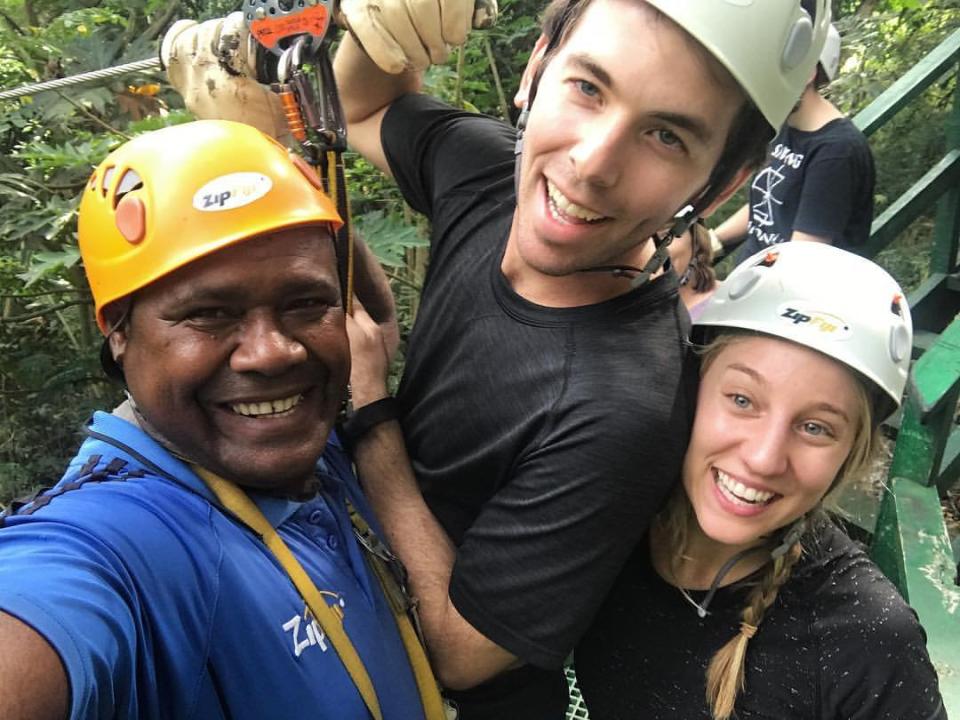A 27-year-old saved over $80,000 in 3 years while living in a major city — and now he's on a 'mini-retirement' traveling the world

Courtesy of Kyle Stimpson
Instead of an early retirement, Kyle Stimpson opted for a mini-retirement, taking time off work to travel for at least six months.
To fund his mini-retirement, he saved 30% to 40% of his income for three years, socking away over $80,000 while living in Sydney, Australia.
Stimpson saved money by renting a modest apartment, cooking most meals at home, and spending little on shopping and entertainment.
For Kyle Stimpson and his partner Lauren, opting for a mini-retirement over an early retirement was a no-brainer.
"It has never made sense to me to work your whole life and save all of the fun and enjoyment for the end, when you might not have the health or energy to do the things you want," the 27-year-old told Business Insider. "Not to be morbid, but we're not even guaranteed a long life so we need to enjoy today and not postpone truly living."
Stimpson has always enjoyed traveling and wanted to experience a trip that lasted longer than two weeks. He and Lauren left Chicago for Sydney, Australia, in pursuit of change, warm weather, and new jobs in September 2015. Fast forward three years later, and he and Lauren decided to break away from work and travel for at least six months beginning in June 2018.
"Travel is not just for the rich, since once you leave behind your expensive lifestyle, life on the road can actually be fairly cheap," said Stimpson, who envisions taking a mini-retirement every 10 years.
"I enjoy my work when it's something that has meaning and allows me to contribute something positive to society, so I don't see the point in ever completely retiring from work," he said. "However, at certain stages in life, why not take a break to travel, spend time with family, or recharge your batteries before starting a 'new' project?"
To fund his mini-retirement, Stimpson saved 30% to 40% of his post-tax income for three years by creating a budget and savings plan. His frugality paid off — he saved over $80,000 during those three years, and he's allocating $20,000 toward his first mini-retirement with Lauren.
In order to save, Stimpson put away a percentage of every paycheck directly into savings. He divided the rest of his money into spending categories for every expense, such as rent, food, bills, and transportation, each of which had a limit to ensure he didn't overspend.
By adhering to this simple budget, Stimpson used his leftover money wisely and sparingly. What makes his dedication even more impressive is that he did all this while living in one of the most expensive cities in the world — Sydney, Australia.
In Sydney, two-bedroom apartments are on average $2,052 a month, the cost of a pint of beer is $6.10, and the monthly cost of a transportation ticket is $127.10, according to Deutsche Bank's "Mapping the world's prices" report.
Yet, he was able to enjoy the city's offerings while saving a good portion of his income. "Once you have a goal in your sights, it becomes a lot easier to stick to the plan," Stimpson said.
Here are the five strategies he used to save:
Manage living expectations — Instead of renting a more expensive place, Stimpson and Lauren saved at least $1,000 to $2,000 a month by living in a smaller, non-renovated bedroom in a third-floor walk-up.
Take public transportation — Stimpson has a company car, but would never have his own car otherwise because he spends roughly $300 on fuel, $200 on tolls, and $300 on registration and insurance a month. Uber also costs twice as much in Sydney as it does in Chicago. However, public transport costs between $1.50 and $5, depending on the trip's length.
Cook at home and shop local — Stimpson and Lauren have saved hundreds of dollars per month on food costs by shopping at local farmer's markets and making their meals at home.
Enjoy the outdoors — They also took advantage of free or low cost outdoor activities, such as going to the beach, visiting national parks, and hiking.
Minimize alcohol consumption — One or two nights a week at the bar in Sydney can set you back hundreds of dollars a month, so Stimpson limits or avoids bars to support his savings plan.
Stimpson began his mini-retirement in June, and he's already budgeted his money for each leg of the trip. After a short trip in Australia, he and Lauren will head to Southeast Asia for three months, where they're planning to spend around $2,000 a month, and then to Europe for three months with a monthly budget of $4,000. There, they'll be staying with a few friends and volunteering on an eco-farm in Italy.
Related Video:
For more news videos visit Yahoo View.
NOW WATCH: The simple rule this couple follows to avoid fighting about money
See Also:
More than half of 20-somethings still count on money from their parents to pay their bills
What 8 people wish they knew before retiring in their 20s and 30s
DON'T MISS: What 8 people wish they knew before retiring in their 20s and 30s

 Yahoo Finance
Yahoo Finance 
